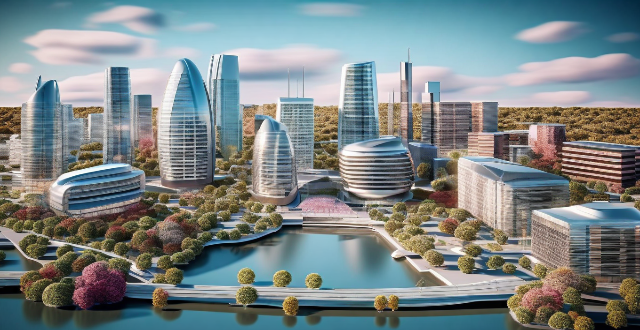Urban planners face numerous challenges in designing future cities, including rapid urbanization, environmental sustainability, social equity and inclusivity, and technology integration. Addressing these challenges requires careful planning, collaboration with stakeholders, and innovative solutions to create thriving, sustainable, and inclusive cities for all residents.

Challenges Faced by Urban Planners in Designing Future Cities
Urban planners are tasked with the responsibility of designing future cities that are sustainable, livable, and resilient. However, this is not an easy feat as they face numerous challenges along the way. Some of these challenges include:
1. Rapid Urbanization
- Population Growth: The world's population is expected to reach 9.7 billion by 2050, with two-thirds living in urban areas. This rapid growth poses a significant challenge for urban planners who must accommodate the increasing number of residents while ensuring adequate resources and infrastructure.
- Resource Allocation: With more people moving into cities, there will be greater demand for resources such as water, energy, and food. Urban planners must find ways to efficiently allocate these resources to meet the needs of all residents.
- Housing Shortages: As more people move into cities, there will be a greater demand for housing. Urban planners must ensure that sufficient housing is available to meet this demand and that it is affordable and accessible to all residents.
2. Environmental Sustainability
- Climate Change: Cities contribute significantly to greenhouse gas emissions, which exacerbate climate change. Urban planners must design cities that reduce carbon footprints and promote sustainable practices such as renewable energy sources and green transportation options.
- Natural Disasters: Climate change has led to an increase in natural disasters such as floods, hurricanes, and wildfires. Urban planners must design cities that are resilient to these events and have emergency response plans in place.
- Resource Depletion: Cities consume vast amounts of resources such as water and energy. Urban planners must find ways to reduce consumption and promote conservation practices to ensure long-term sustainability.
3. Social Equity and Inclusivity
- Income Inequality: Cities often have stark income inequality, which can lead to social unrest and crime. Urban planners must address this issue by creating affordable housing options and promoting economic development in disadvantaged neighborhoods.
- Accessibility: Ensuring that all residents have access to essential services such as healthcare, education, and public transportation is crucial for creating inclusive cities. Urban planners must design cities that are accessible to people with disabilities and those who may face barriers to accessing services.
- Cultural Preservation: As cities grow and evolve, it is important to preserve their cultural heritage and identity. Urban planners must work with community members to ensure that cultural landmarks and traditions are preserved and celebrated.
4. Technology Integration
- Smart City Infrastructure: Integrating technology into city infrastructure can improve efficiency and sustainability. However, urban planners must ensure that technology is used ethically and responsibly and does not create new problems or exacerbate existing ones.
- Data Privacy: As cities become more reliant on technology, concerns about data privacy and security arise. Urban planners must ensure that data collected through smart city initiatives is protected and used only for its intended purposes.
- Digital Divide: Not all residents may have access to or be comfortable using technology. Urban planners must ensure that technology integration does not widen the digital divide and leaves behind those who cannot afford or do not want to use technology.
In conclusion, designing future cities presents numerous challenges for urban planners. Addressing rapid urbanization, environmental sustainability, social equity and inclusivity, and technology integration requires careful planning, collaboration with stakeholders, and innovative solutions. By facing these challenges head-on, urban planners can create cities that are thriving, sustainable, and inclusive for all residents.